Cathedral school’s Jai-Veeru—Dhananjaya ‘Danny’ Yeshwant Chandrachud and Ashok ‘Juggy’ Jahagirdar— are now Chief Justice of India in waiting, and IT consultant respectively. The latter joins Mumbai advocates to paint a picture of a man who they say is a unique legal mind because of the city that shaped him
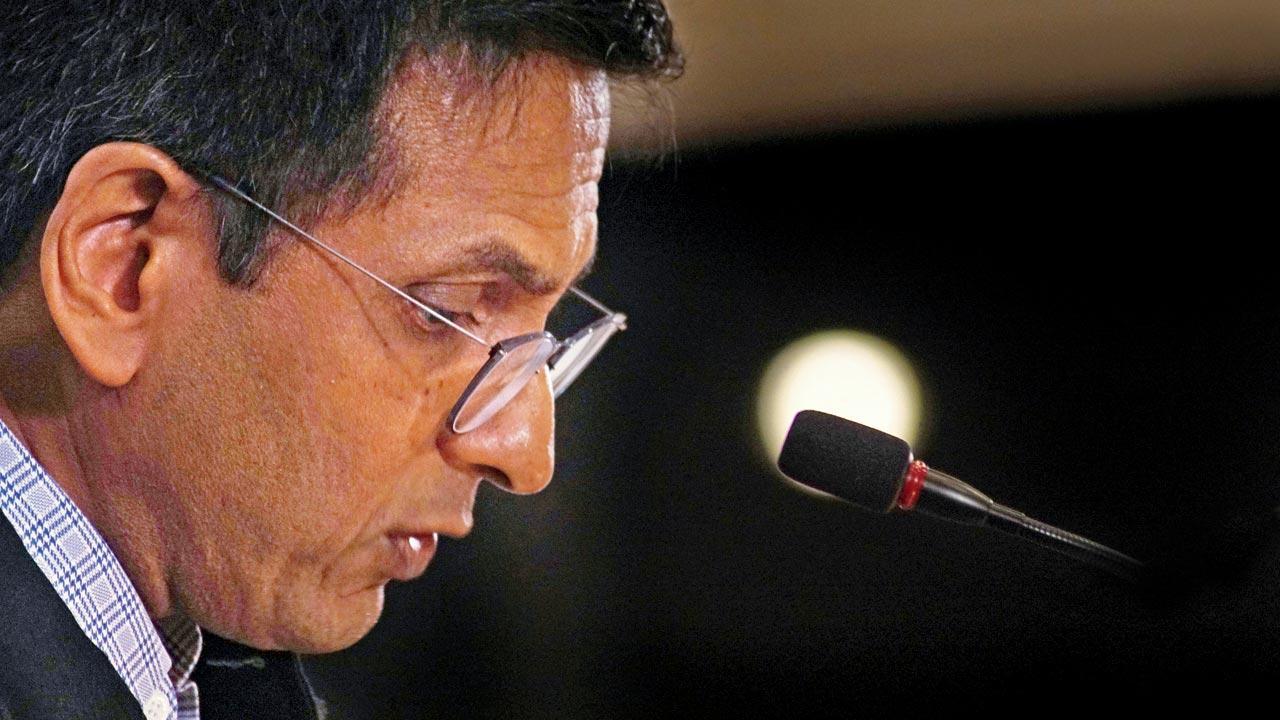
Justice Chandrachud who takes over as India’s 50th CJI next month is a favourite with millennials for his empathetic views and stance on fundamental rights. Pic/Getty Images
Sporting a bright red tee representing Barham house, IT consultant Ashok Jahagirdar touches a stone wall of the 162-year-old Cathedral and John Connon School in Fort. It has taken him back to 1969 when a young Danny would loiter with him through these corridors. Outside the gates of the school, they’d play cricket, swim, and grab lunch at Bombay Gymkhana next door.
Justice Dhananjaya Yeshwant Chandrachud, who is all set to take over as India’s 50th Chief Justice of India (CJI) is good ol’ Danny for his childhood friend.
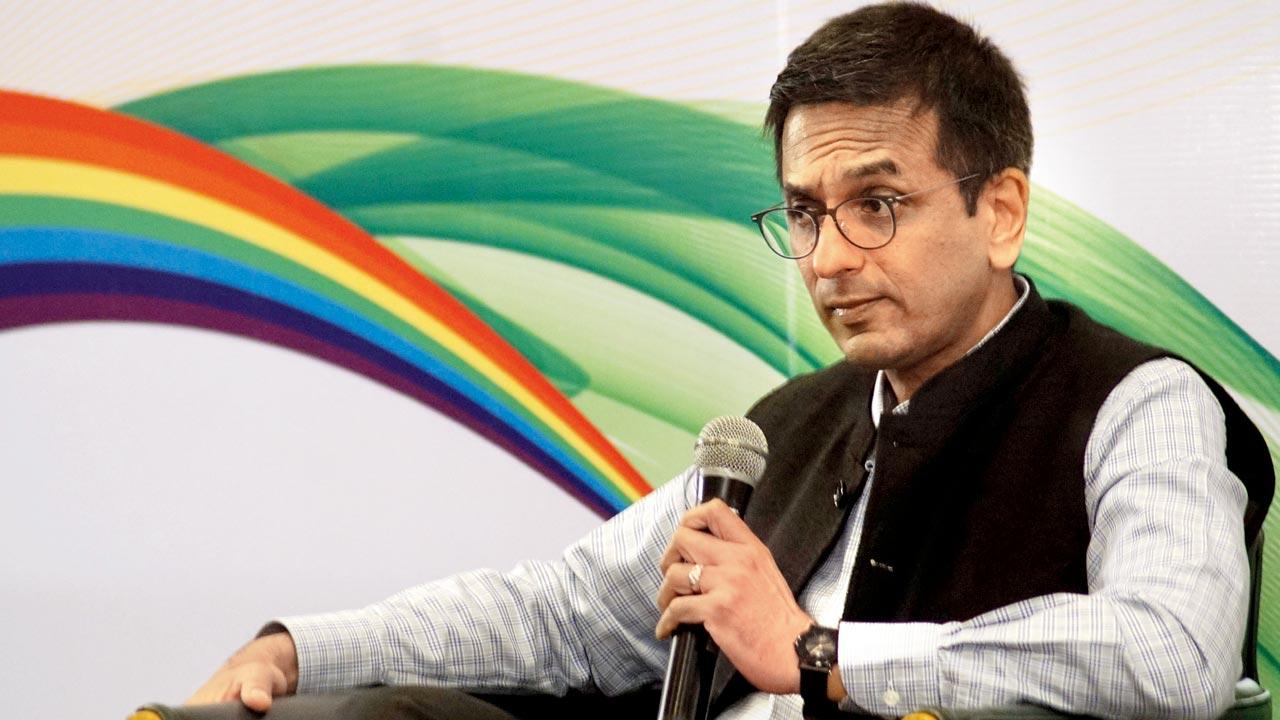 Justice DY Chandrachud, then Supreme Court judge, at The Literature Live Independence Lecture “u201cImagining Freedom Through Art” in 2019, Mumbai. He is set to assume office as the 50th Chief Justice of India next month for a two-year term. He succeeds Justice UU Lalit. Pic/Getty Images
Justice DY Chandrachud, then Supreme Court judge, at The Literature Live Independence Lecture “u201cImagining Freedom Through Art” in 2019, Mumbai. He is set to assume office as the 50th Chief Justice of India next month for a two-year term. He succeeds Justice UU Lalit. Pic/Getty Images
Chandrachud will take oath of office on November 9, two days before his 63rd birthday. The man who spent his formative years in the city and later, returned to practice as Senior Advocate at the Bombay High Court and then as permanent judge, say his colleagues and opponents, is hugely influenced
by Mumbai.
The son of classical singer Prabha Chandrachud and Justice YV Chandrachud, India’s 16th and longest serving CJI, he was born on November 11, 1959 and continued to live in Mumbai until the family moved to Delhi when his father was appointed to the Supreme Court in 1972. He continued his schooling at Delhi St Columba’s, and acquired an Honours in Economics and Mathematics from St Stephen’s College. This, he followed, with a law degree from Delhi University before he joined one of the most prestigious law schools at Harvard University for a Masters and Doctor of Judicial Sciences degree.
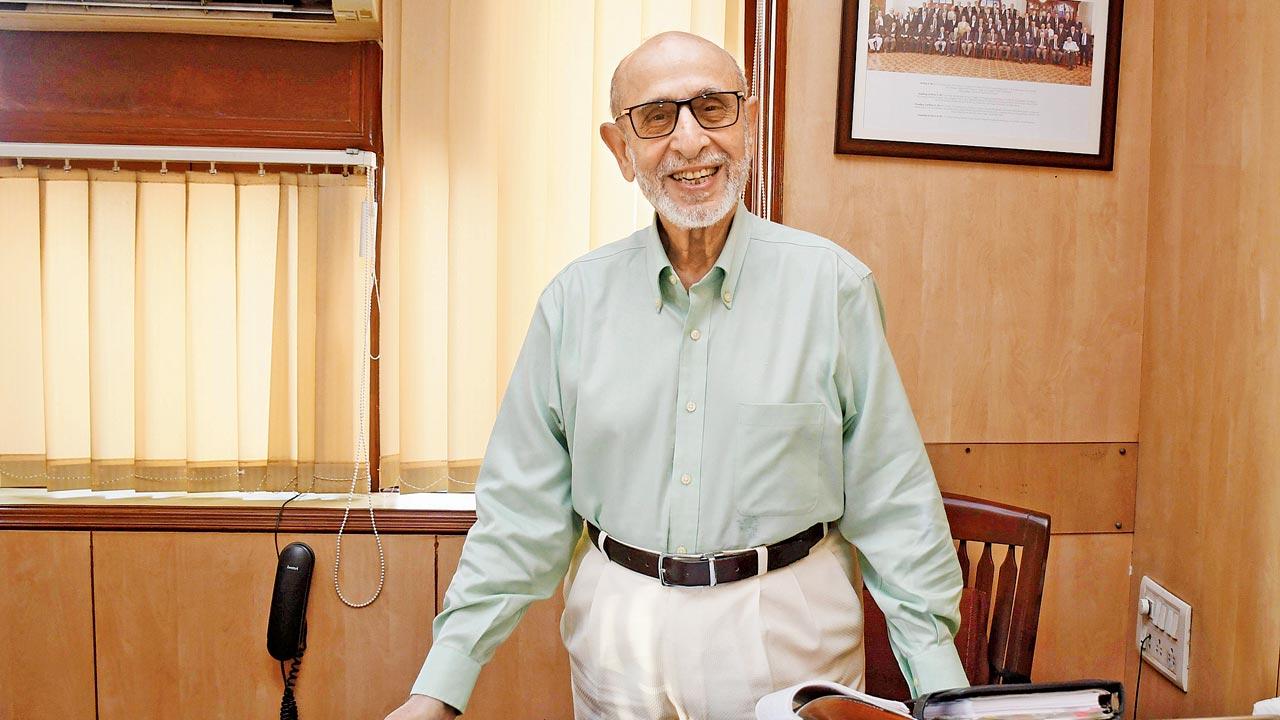 Senior Advocate Yusuf Hatim Muchhala believes Mumbai certainly impacted Justice Chandrachud’s personality. He remembers him as the most sought after junior counsel in the 1980s for his objective, logical and excellent court craft. Pics/Ashish Raje
Senior Advocate Yusuf Hatim Muchhala believes Mumbai certainly impacted Justice Chandrachud’s personality. He remembers him as the most sought after junior counsel in the 1980s for his objective, logical and excellent court craft. Pics/Ashish Raje
“Danny and I go back ages, right from the time the universe existed...,” laughs Jahagirdar, whose grandfather PB Gajendragadkar served as CJI from 1964 to 1966. Both boys belonged to Cathedral’s red—Barham house, were on the same cricket team and sat beside each other in class. “The school once arranged for what is called the hot lunch at Bombay Gymkhana club next door. Danny and I went. But we were vegetarians, so for two days, we only ate daal-chawal and papad. On the third day, we were given a cutlet which was a bit dry and coarse. They gave us gravy too, but it didn’t occur to us that the cutlet had to be eaten with the gravy to soften it. Danny held on to the hard cutlet and asked me to pull it from the other end. I dug my head into the table. He insisted: ‘pull, Juggy, pull!’. He was and still is a fun guy.”
Not too many are aware that Chandrachud is hugely passionate about cricket. “When his father became a judge at the Bombay HC, they moved into this huge bungalow with a lawn. There was space to play cricket which was his passion. He is a fast bowler and took pride in being one. Till today, he remains the guy who will slip on his cricket shoes when an opportunity presents itself.” Jahagirdar says it was a teacher in the third standard who thought it was easier to call him Danny instead of the convoluted Dhananjaya; parents fondly call him “Dhanu”. Jahagirdar is allowed to call him either. He describes his childhood friend as “an uncomplicated personality”, a non-conformist who intervenes for change. Senior advocate at the Bombay High Court, Arif Bookwala agrees.
“Sometime around 2004, a few of us lawyers, were to be designated as Senior Advocates. But there was opposition to this from some judges. When it came to the notice of Justice Chandrachud, he requested his fellow judges to not fight over the matter, but to be brothers in law. Immediately after, we got our letters stating our new posts. That’s how I got my gown with his intervention.”
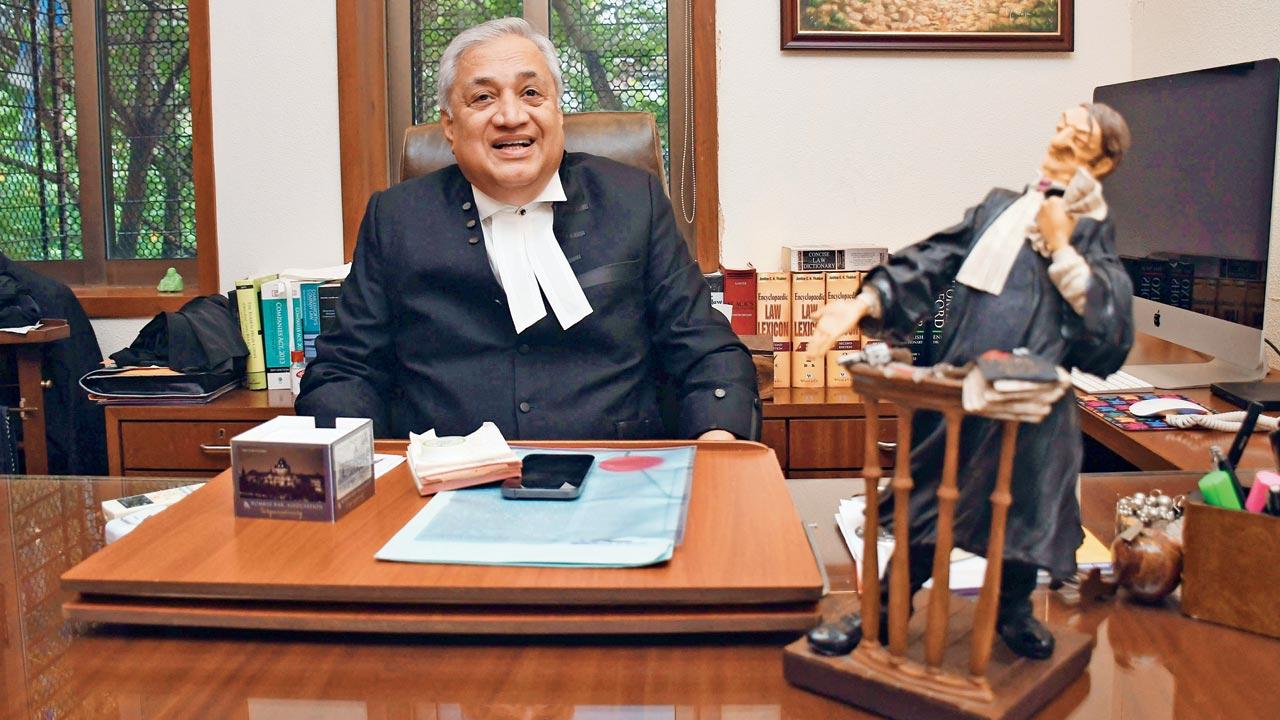 “His intervention led to my getting my gown as Senior Advocate,” says Arif Bookwala, who has argued against Justice Chandrachud during his time at Bombay High Court and appeared before him when the latter was judge there
“His intervention led to my getting my gown as Senior Advocate,” says Arif Bookwala, who has argued against Justice Chandrachud during his time at Bombay High Court and appeared before him when the latter was judge there
A humble man despite his privileged background, as Bookwala puts it, Chandrachud rarely lost his temper in court. Pleasant and encouraging to colleagues and juniors is how most remember him. “There are judges who shout in court; Justice Chandrachud was not one of them, even if he knew the advocate was making a nonsensical point.” A silent wit was also apparent during hearings chaired by him. “I was in court once, even though it was not my case, and the advocate on record kept on calling one Act of Parliament unfair. Justice Chandrachud smiled at the advocate and asked him to name his local MP. The advocate unable to understand where the judge was heading, asked how the case and the question were connected? Justice Chandrachud then asked the advocate to approach his local MP, tell him the Act is wrong and coax the politician to move a Bill in Parliament to change it,” laughs Bookwala. ‘’Bolte hai na, haste-haste qurbani kar dena; something of that sort could happen to you; you wouldn’t even realise that you’ve lost to him or that he has just passed an order against you. He does it all with a smile.” Bookwala has appeared both against Justice Chandrachud in court as advocate, and also before him when he was judge.
Even before he was in the race to be the next CJI, he seemed to have gained recognition outside of the legal fraternity, courtesy his liberal, forward-looking judgments that touched many. This includes the decriminalisation of Section 377 of the IPC in the Navtej Johar versus Union of India case, thereby legalising same-sex intercourse between consenting adults. This allows India’s LGBTQAi+ community to hold this up as guarantee of their constitutional rights. Justice Chandrachud also made headlines when he was the sole dissenter in the Justice KS Puttaswamy versus Union of India case, holding on to his own, stating that Aadhar was unconstitutionally passed as a Money Bill.
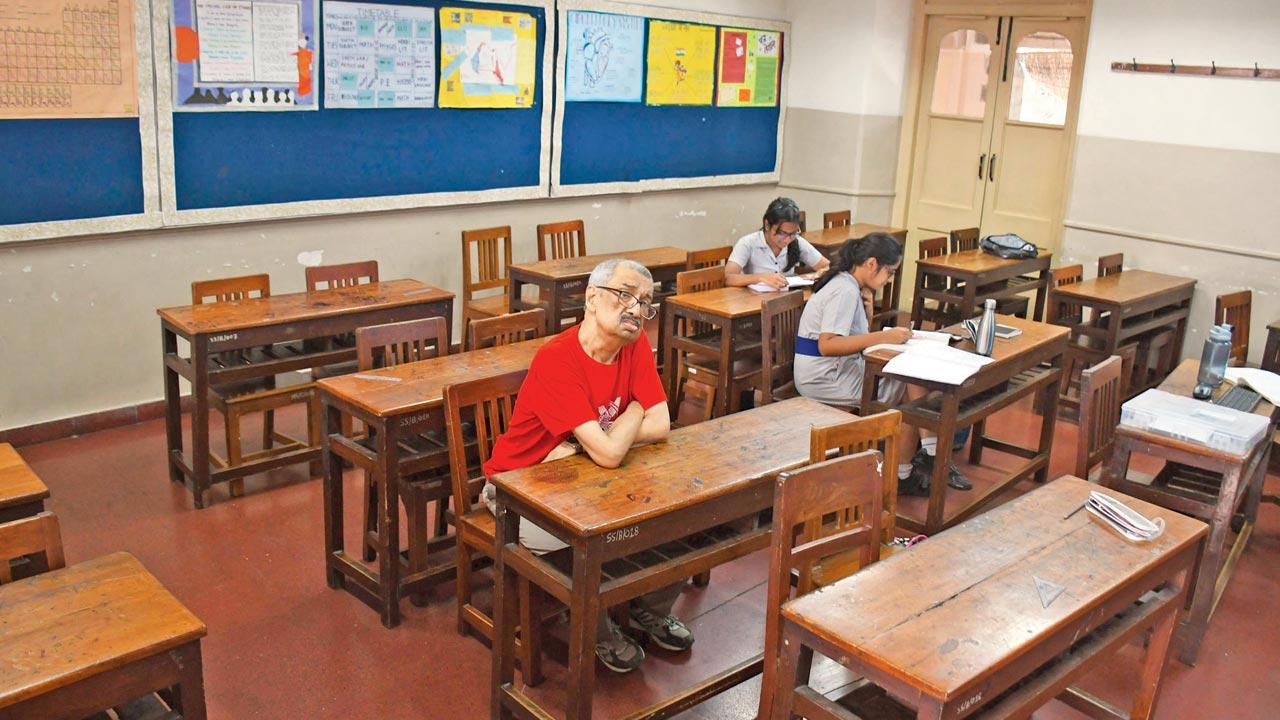 Ashok Jahagirdar visits a classroom at Fort’s Cathedral and John Connon School where he and Justice Chadrachud belonged to Barham house, were on the same cricket team and sat beside each other in class. Pic/Ashish Raje
Ashok Jahagirdar visits a classroom at Fort’s Cathedral and John Connon School where he and Justice Chadrachud belonged to Barham house, were on the same cricket team and sat beside each other in class. Pic/Ashish Raje
“A Senior Advocate at the Bombay HC once told me that one of his cases concerning copyright issues was not coming before Justice Chandrachud and that he was the only man who would understand the matter. That’s his reputation within the legal fraternity—of a fair and objective man with new views,” says Bookwala. “As an advocate too, he made beautiful arguments, which he would keep to himself, rarely interrupting another advocate. When it was his turn though, he would silently checkmate with a smile.”
Yusuf Hatim Muchhala is a Senior Advocate at the Bombay HC and the Supreme Court. He is also an executive committee member of the All India Muslim Personal Law Board. He remembers Justice Chandrachud as a young man in the ’70s and ’80s, who started his practice under Senior Advocate YS Chitale in Delhi after his return from Harvard. “I had the chance to work with him on quite a few matters along with YS Chitale. He was a brilliant young man. Later, he shifted to Bombay and soon developed a lucrative practice on the original side of the Bombay HC. He was a much sought after junior counsel by leading firms and solicitors. His quick grasp of subjects, excellent court craft and articulation made him one of the most promising young counsels in the ’80s.”
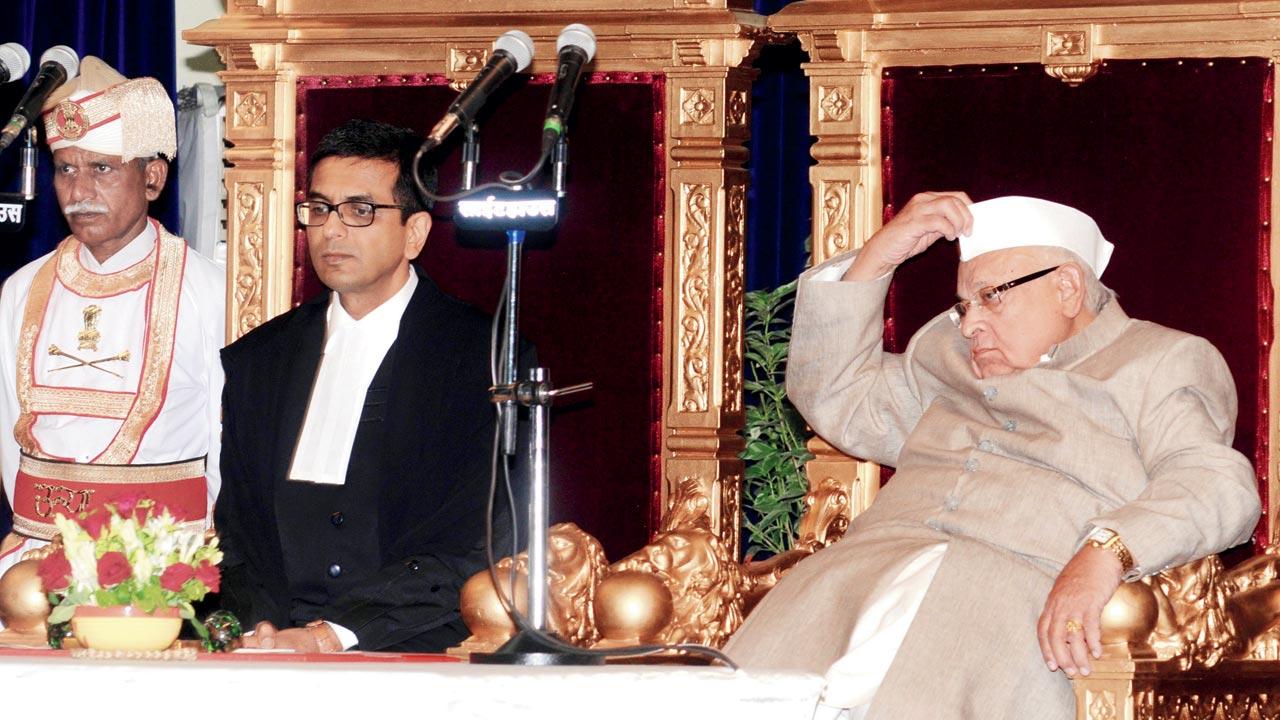 Then Allahabad High Court Chief Justice, DY Chandrachud administered the oath of office to Aziz Qureshi as the Uttar Pradesh governor at Raj Bhavan in 2014 in Lucknow. Pic/Getty Images
Then Allahabad High Court Chief Justice, DY Chandrachud administered the oath of office to Aziz Qureshi as the Uttar Pradesh governor at Raj Bhavan in 2014 in Lucknow. Pic/Getty Images
Muchhala adds that when the Srikrishna Commission of Inquiry was constituted by the Government of Maharashtra under Justice Srikrishna for investigating the causes of the Bombay riots of 1992-93, Justice Chandrachud was the first choice to be the commissioner’s counsel. “He appeared on a few occasions, but then excused himself from the commission’s proceedings. He did not offer a reason, but he was the go-to person for it because of his reputation as an objective man who had a grasp of the facts and law.”
Mumbai, thinks Muchhala, helped define the legal mind’s approach to sensitive cases. “Bombay certainly shaped his personality. The city has a cosmopolitan character; that perhaps may have impacted him. He was fortunate to come from a family, which had Justice YV Chandrachud at its helm. Congenial family surroundings, the healthy atmosphere of the city and his education and travels abroad, all shaped him into the open-minded person he is.”
 Justice DY Chandrachud (second from left) and Ashok Jahagirdar (third from right) at a birthday party of their friend Vivek Hurry (third from left), in 1969
Justice DY Chandrachud (second from left) and Ashok Jahagirdar (third from right) at a birthday party of their friend Vivek Hurry (third from left), in 1969
Mumbai’s casual stance, his friends say, reflects in his character too. They say he doesn’t believe in formalities; surprising, given his choice of profession. Jahagirdar remembers a moot court competition held at Ismailsaheb Mulla Law College in Satara some years back, in honour of his grandfather PB Ganjedragadkar, who Danny and his father looked up to as mentor. “Danny couldn’t attend because he had sprained his ankle playing cricket the day before, so he attended it virtually. I was on the dais with the Vice-Chancellor (VC). When Danny saw me on screen, he immediately shouted out, ‘Hey, Juggy! How are you man?’ The VC was stumped.”
That’s the man his childhood mates know. For everyone else, he is the legal eagle with an intimidating serious stance. “He may have a deadpan face, but he is an emotional person,” says Jahagirdar. He gives the example of him backing virtual courtrooms. “He has done it often... he feels the litigants’ pain, many of whom are affected by repeated physical appearances over several years.”
Jahagirdar says he is just the man the country needs right now to helm the judiciary. “He has after all, even upturned his father’s judgments, not once, but twice—in the adultery law of 2018 and in the right to privacy case of 2017.”
His career in dates
Additional Solicitor General for Union of India
1998 - March 2000
Senior Advocate, Bombay High Court
June 1998 - March 2000
Permanent Judge of Bombay High Court
March 2000 - October 2013
Chief Justice of Allahabad High Court
October 2013 - May 2016
Supreme Court Judge
May 2016 to retire in November 2024
To assume Chief Justice of India office
November 9, 2022
 Subscribe today by clicking the link and stay updated with the latest news!" Click here!
Subscribe today by clicking the link and stay updated with the latest news!" Click here!








